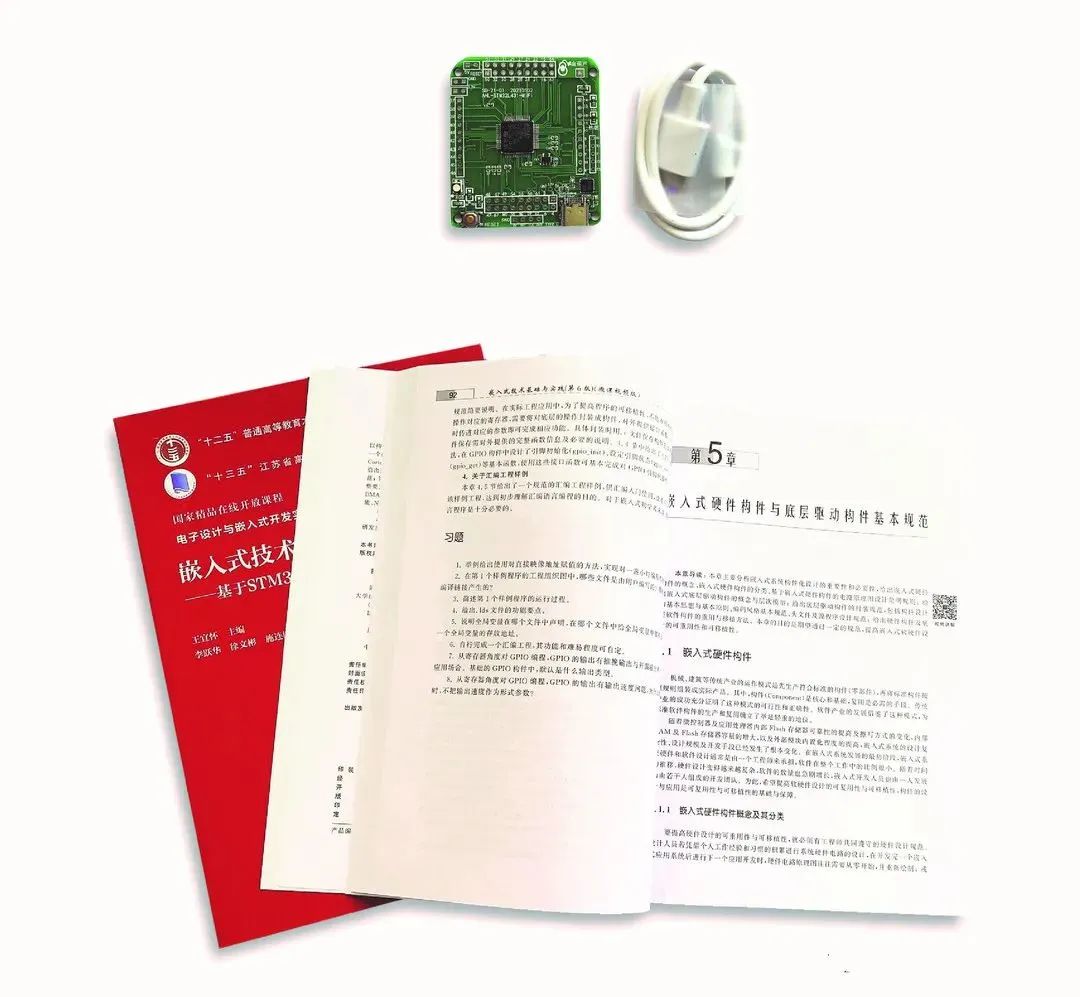Professor Wang Yihuai from Suzhou University, who has a deep collaboration with Arm Technology Education Program, is currently teaching the online open course “Embedded Systems and Applications” based on the Arm® Cortex®-M processor, which has been highly recommended by us. This course has now been recognized as a national quality course.
Embedded systems are an important foundation for embedded artificial intelligence and the Internet of Things. This course is based on the Arm Cortex-M microprocessor, focusing on software and hardware components, and gradually explains the basic knowledge elements of embedded systems and a more standardized design method that combines low-level software and hardware according to the principles of embedded software engineering, following the line of “General Knowledge – Component Usage Methods – Test Examples – Chip Programming Structure – Component Design Methods”.
This is the 14th session of the course, which runs from September 4, 2023, to January 7, 2024.If you want to master the principles of the basic components that make up a computer and learn advanced programming methods, providing a foundation for understanding how software interacts with hardware at the register level, check the information below and enroll now!It’s not too late to join!

Online Open Course: “Embedded Systems and Applications”
0/0
00:00/00:43Progress Bar, 0 percentPlay00:00/00:4300:43Full Screen Playback Speed 0.5x 0.75x 1.0x 1.5x 2.0x HD Smooth
Continue Watching
Free online course: “Embedded Systems and Applications” – 14th session open for enrollment!
Reprinted, free online course: “Embedded Systems and Applications” – 14th session open for enrollment!Arm Education TechnologyAdded to Top StoriesEnter comment Video Details
This video is provided by the instructor
01
Basic Introduction
Course Name: “Embedded Systems and Applications”
Teaching Institution: Suzhou University
Instructors: Wang Yihuai, Zhang Jian, Liu Changyong
Online Learning URL:
iCourse – China University MOOC
https://www.icourse163.org/course/SUDA-1001754273
ClickRead Originalto jump to the enrollment page~
02
Course Overview
The “Embedded Systems and Applications” course serves as a foundational course for related majors in embedded artificial intelligence and the Internet of Things. It is based on the Arm Cortex-M microprocessor and adopts component-based development, providing sample programs (templates) for each knowledge point. Students can complete programs that meet their requirements by slightly modifying these templates. The course gradually explains the basic knowledge elements of embedded systems and a more standardized design method that combines low-level software and hardware according to the line of “General Knowledge – Component Usage Methods – Test Examples – Chip Programming Structure – Component Design Methods”.
03
Course Textbook
The teaching textbook for this course is “Fundamentals and Practices of Embedded Technology (6th Edition) – Based on STM32L431 Microcontroller”. This textbook has been refined over more than ten years, carefully sorting out the general foundational knowledge elements of embedded systems, focusing on balancing general knowledge with chip-related knowledge, understanding the relationship between hardware and software, encapsulating low-level drivers into components, and designing reasonable test cases. The textbook includes concise experimental kits, combined with online electronic resources, facilitating readers’ practical application.

“Fundamentals and Practices of Embedded Technology (6th Edition)” (Edited by Wang Yihuai)
The book includes a general embedded computer GEC, model: AHL-STM32L431, which can complete the basic experiments in the book.
Electronic resource download address and path:
“https://sumcu.suda.edu.cn/” → “Golden Gourd Zone” → “Embedded Book 6th Edition”, with the download index on the right.
Scan the QR code below to purchase the textbook:

04
Course Outline
01 Overview
1.1 Introduction to Embedded Systems
1.2 Definition, Development History, Classification, and Characteristics of Embedded Systems
1.3 Learning Confusions, Knowledge System, and Learning Suggestions for Embedded Systems
1.4 Introduction to Microcontrollers and Application Processors
1.5 Common Terms in Embedded Systems
02 Arm Cortex-M4 Microprocessor
2.1 Introduction to Arm Cortex-M4 Microprocessor
2.2 Addressing Methods and Machine Code Acquisition Methods
2.3 Basic Instruction Classification Analysis
2.4 Basic Syntax of Assembly Language
03 Memory Mapping, Interrupt Sources, and Minimal Hardware System
3.1 Overview of STM32L Series MCUs
3.2 Pin Diagram and Minimal Hardware System of STM32L4
3.3 Building a General Embedded Computer from MCU
04 GPIO and Program Framework
4.1 General Knowledge of GPIO
4.2 Methods of Software Interference with Hardware
4.3 Understanding Engineering Framework
4.4 Process of Making GPIO Components
4.5 First Assembly Language Project: Control LED Blinking
4.6 Experiment One: Familiarization with Experimental Development Environment and GPIO Programming
05 Basic Specifications for Embedded Hardware Components and Low-Level Driver Components
5.1 Embedded Hardware Components
5.2 Concept and Hierarchical Model of Low-Level Driver Components
5.3 Packaging Specifications for Low-Level Driver Components
5.4 Reuse and Porting Methods for Hardware Components and Their Driver Components
06 Serial Communication Modules and First Interrupt Program Structure
6.1 General Knowledge of Asynchronous Serial Communication
6.2 Component-Based Serial Communication Programming Methods
6.3 Process of Making UART Components
6.4 Interrupt Mechanism and Steps for Interrupt Programming
6.5 Experiment Two: Serial Communication and Interrupt Experiment
07 Timer-Related Modules
7.1 General Knowledge of Timers
7.2 Timers in STM32L431
7.3 Pulse Width Modulation
7.4 Input Capture and Output Comparison
7.5 Experiment Three: Timer and PWM Experiment
08 Flash Online Programming, ADC, and DAC
8.1 Flash Online Programming
8.2 ADC
8.3 DAC
8.4 Experiment Four: ADC Experiment
09 SPI, I2C, and TSC Modules
9.1 Serial Peripheral Interface SPI Module
9.2 Integrated Circuit Interconnect Bus I2C Module
9.3 Touch Sensing Controller TSC Module
9.4 Experiment Five: SPI Communication Experiment
10 CAN Bus, DMA, and Bit-Band Operations
10.1 CAN Bus
10.2 DMA
10.3 Bit-Band Operations
11 System Clock and Other Functional Modules
11.1 Clock System
11.2 Reset Module and Watchdog Module
11.3 Power Control Module and CRC Check Module
11.4 Experiment Six: Comprehensive Experiment
12 Application Cases
12.1 Stability Issues in Embedded Systems
12.2 Programming Methods for External Sensors and Actuators
12.3 Brief Examples of Real-Time Operating Systems
12.4 Brief Examples of Embedded Artificial Intelligence
12.5 Introduction to NB-IoT Applications
12.6 Applications of 4G, Cat1, Wi-Fi, and WSN
05
Prerequisites
Must possess the following knowledge:
-
Basic Computer Hardware (or Analog Circuits and Digital Circuits, Computer Composition, Assembly Language, Microcomputer Principles)
-
Advanced Programming Language Design (such as C language)
Through learning the above courses, students will master the principles of the basic components that make up a computer, learn advanced programming methods, and provide a foundation for understanding how software interacts with hardware at the register level.
 Click the “Read Original” below to go to the MOOC website to enroll in the “Embedded Systems and Applications” quality course!
Click the “Read Original” below to go to the MOOC website to enroll in the “Embedded Systems and Applications” quality course!
Reprinted from | Arm Technology Academy
Copyright belongs to the original author. If there is any infringement, please contact for deletion.
END
关于安芯教育
安芯教育是聚焦AIoT(人工智能+物联网)的创新教育平台,提供从中小学到高等院校的贯通式AIoT教育解决方案。
安芯教育依托Arm技术,开发了ASC(Arm智能互联)课程及人才培养体系。已广泛应用于高等院校产学研合作及中小学STEM教育,致力于为学校和企业培养适应时代需求的智能互联领域人才。